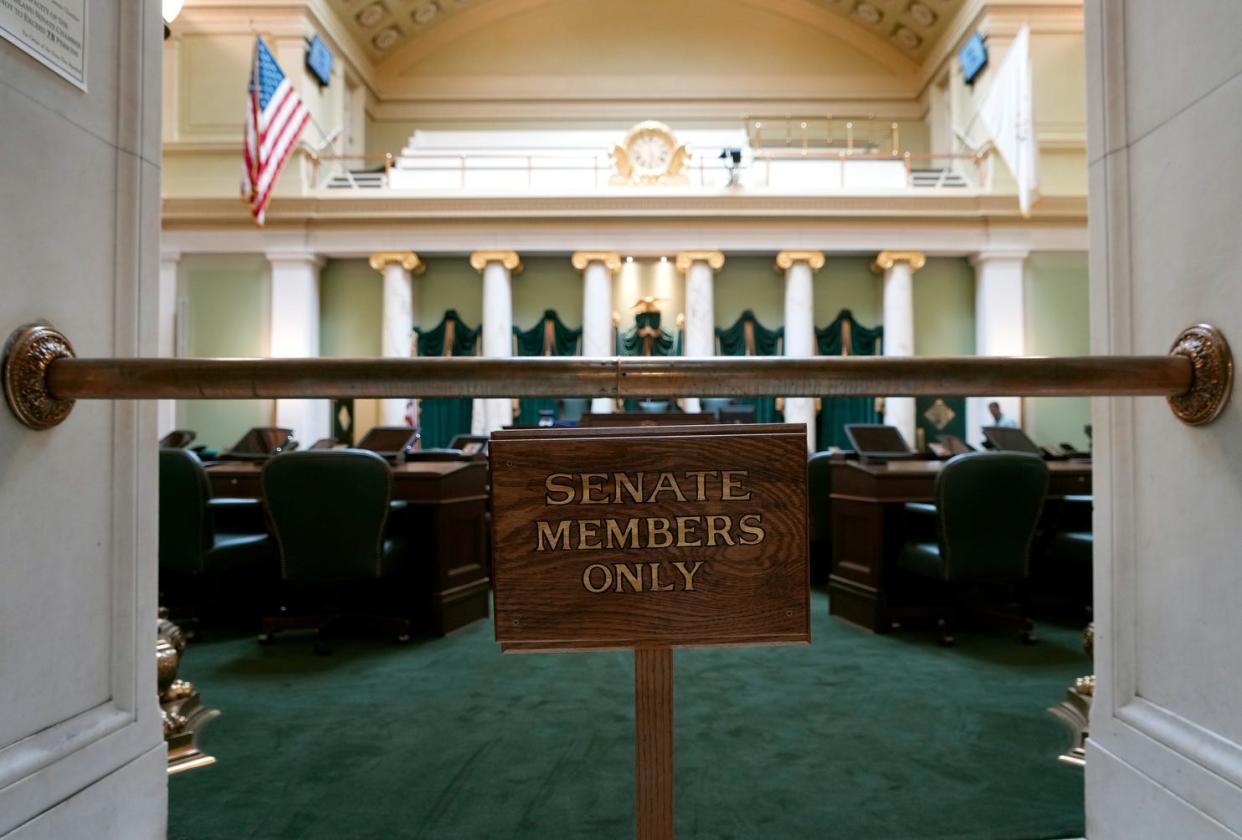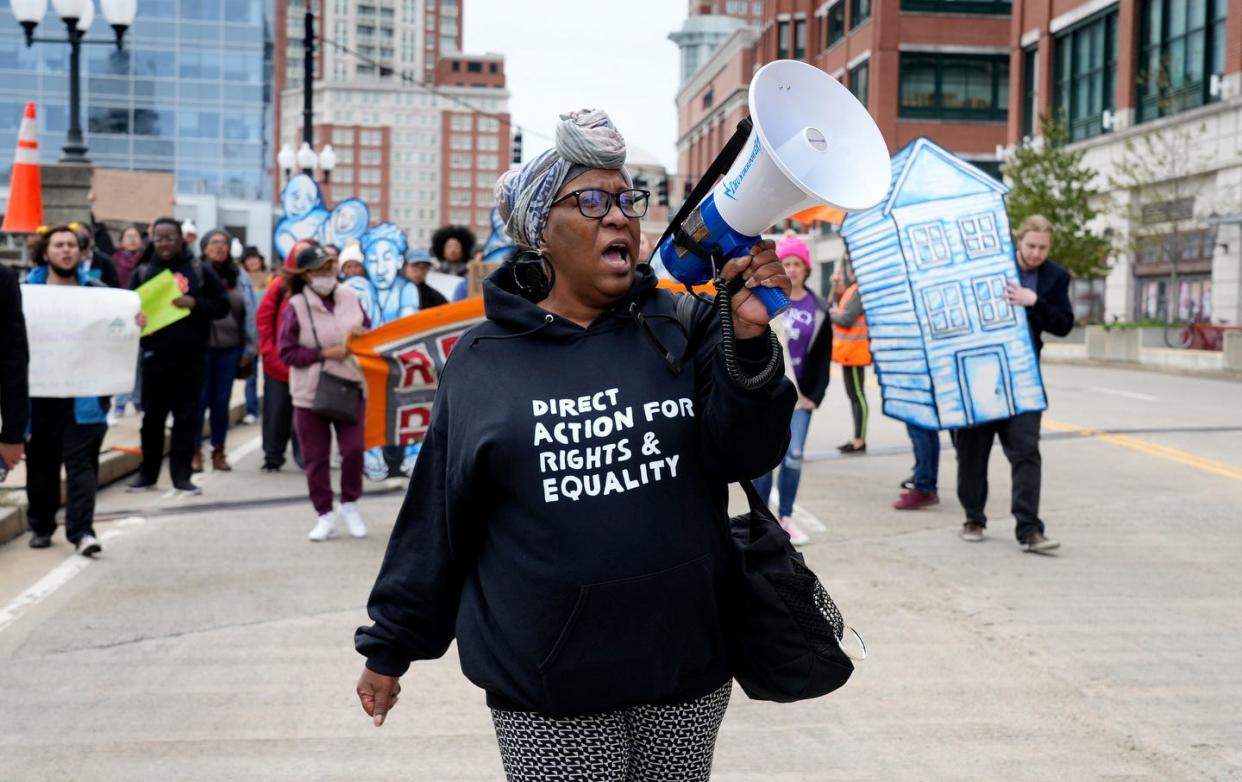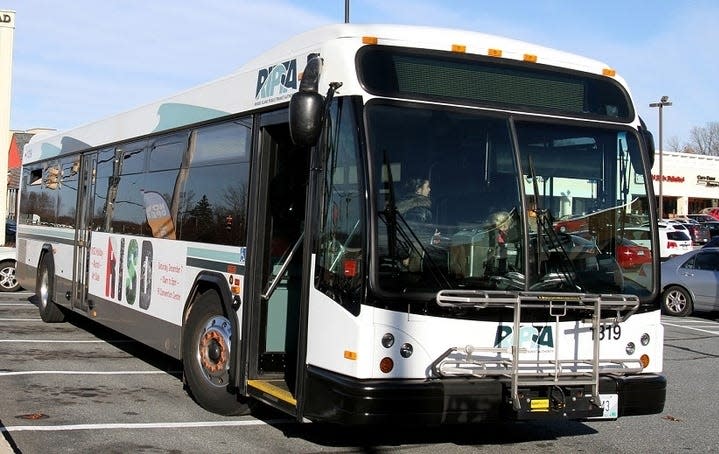RI lawmakers come back next week for a new session. Here's what will spark debate.
PROVIDENCE – At 4 p.m. on Tuesday, the State House merry-go-round begins anew.
The late-night hearings won't start immediately, but they'll begin soon enough as Rhode Island's $19,036.76-a-year part-time lawmakers return, after a six-month hiatus, largely to the same gnawing issues they left behind.
Big segments of Rhode Island's health care system are in crisis. The state's public transit system is facing a "fiscal cliff." There are worker shortages across the board, despite round after round of public employee bonuses. Rhode Island's retired public employees want their COLAs back. Lots of folk want a tax cut.
Secretary of State Gregg Amore wants a new $100 million building to house the archives. And General Treasurer James Diossa wants to put a potential $13.9 million into a new "Baby Bonds" program that children born into poverty can use when they reach adulthood. Details to come.

The many demands for money are competing at a time when State House leaders say they are keenly aware that the billions in federal pandemic aid they've been able to hand out liberally over the last few years are drying up.
"We don't have a billion dollars in ARPA money. We don't have CARES Act money. We don't have infrastructure money," House Speaker K. Joseph Shekarchi said recently. "So we need to learn to live within our own state budget, our own state funds."
The House plans to meet Tuesdays and Thursdays most weeks, early in the session, and the Senate on Thursdays only.
What are the likely debate points?
Funds for housing and protections for tenants
Even after appropriating $250 million in COVID cash for housing programs in 2022 and passing more than a dozen permitting-reform bills meant to speed construction last year, housing policy will be front and center in 2024.
Housing Secretary Stefan Pryor has asked for the largest state housing bond ever – $100 million – to fund construction of more homes.
To supplement that borrowing, he also wants to extend the hotel tax to short-term rentals through sites like Airbnb and VRBO, an idea lawmakers have already been looking at in response to communities outraged at the proliferation of neighborhood vacation rentals.
If a large housing bond does pass, some advocates want at least some of the money to help improve aging public housing and build new publicly owned housing along lines drawing support from public housing authorities and trade unions.
It might not draw as much attention as Shekarchi’s 2023 permitting package, but there is expected to be a push to allow small apartment buildings to be constructed under a less restrictive section of the state building code.
And Shekarchi has vowed to pass the one priority in his 2023 housing package – legalizing accessory apartments or “granny flats” – this year. Senate leaders balked and said again, just recently, they still have concerns about where add-ons to single-family homes could lead.

Tenant protections are another major thrust, and the advocacy group Reclaim Rhode Island is expected to introduce a Tenants Bill of Rights package with a half-dozen bills.
The package is expected to include: a right to legal counsel in eviction cases, a requirement that landlords show cause to evict; minimum standards of apartment habitability; and a ban on landlords rejecting applicants based on credit score.
A push for rent control has better prospects in Providence than at the state level.
"We urgently need cities like Providence to enact rent control, and for public housing authorities to build a new generation of state-financed mixed-income public housing," Reclaim tenant organizer Shana Crandell wrote in an email. "The legislature must also swiftly act to protect Rhode Island tenants’ right to stay in the homes where they already live: we urgently need the Tenants’ Bill of Rights."
Is this the year of the bottle bill?
Passage of a Massachusetts-style “bottle bill” with deposits on beverage containers is a non-starter with top lawmakers.
But they acknowledge that beverage litter, especially from miniature plastic “nip” liquor bottles, is a problem, and they've promised to work on a solution based on the findings of a study commission that met over the fall.
More: Tons of recyclables end up in the landfill. What experts say is needed to fix the problem.
A critical moment for RIPTA
Does Rhode Island’s state bus system need more money, new management or both?
The quasi-independent Rhode Island Public Transit Authority faces a $20 million to $30 million “fiscal cliff” caused by the exhaustion of COVID aid, ridership that hasn’t fully recovered, and rising labor costs.
But top lawmakers are reluctant to give RIPTA more money, and Senate President Ruggerio thinks current management is to blame.

At the same time that it tries to prevent the major service reductions that would come without more money, RIPTA is seeking extra cash to improve bus frequency and build a new high-capacity bus or light rail line from Central Falls to Warwick.
And if that weren’t enough to juggle, Gov. Dan McKee wants to move the state’s central bus hub out of Kennedy Plaza in downtown Providence to a vacant lot on the fringe of the city's central business district.
Construction projects in need of money
As always, lawmakers are being asked for money to pay for a wide array of construction projects, and only some will make the cut.
Secretary of State Amore wants a new state archives building across the street from the State House.
Providence Mayor Brett Smiley wants financial help to take over and renovate the deteriorated Cranston Street Armory.
The Judiciary wants to build a new home for Providence District Court in Cranston.
The owner of the "Superman Building" may want more money, although he hasn't said so yet, to help finish the conversion of the former Industrial Trust bank tower to apartments.
And the owner of the under-construction Pawtucket soccer stadium is expected to eventually, if not this year, want money to build apartments and shops on the opposite bank of the Seekonk River.
Rhode Island's doctor shortage and medical crisis
With Rhode Island affected by a national doctor shortage – specifically, a shortage of primary-care doctors and clinicians – the state's top health regulator and the Rhode Island Medical Society want insurers and Medicaid to raise their reimbursement rates to make Rhode Island more competitive with Massachusetts and Connecticut.
The Medical Society would also like the state to pay for medical school, as well as physician assistant or nurse practitioner school, for a limited number of Rhode Islanders in exchange for a pledge to practice primary care in the state for several years.
"The very low reimbursement rates in Rhode Island from the Medicaid program has greatly contributed to our problems," says Stacy Paterno, the Medical Society spokeswoman. Beyond that, "the suspension of some of the COVID-related rules related to telemedicine have left many ... individuals without adequate access to their care teams."
"Enhanced primary care payment will be necessary, but not sufficient. ... We aim to address theallocation of clinician time by meaningfully reducing the use of prior authorization and other burdens," the Rhode Island Health Insurance Commissioner said in a mid-December report.
The hospital lobby also wants the state – and potentially the legislature – to commit to raise reimbursement rates.
Solar siting also primed for debate
At community meetings in town halls across the state, rural solar farms are politically toxic, but in the General Assembly solar developers have historically held sway.
Expect efforts to accelerate the spread of solar panels across the state and to run headlong into bills to slow it down.
Education issues that will dominate the session
Since the end of the pandemic, the state has kept funding school districts that have lost students – to private schools, publicly funded charters or unknown alternatives – at the same levels as when those children were still there.
Providence, which continues to operate under a state takeover, is a poster child for this phenomenon.
“If we made no changes to the statewide funding formula last year, Providence would've lost, I think it was well over 10 million [dollars],” Senate Majority Leader Ryan Pearson said in a recent interview. “How long can we sustain these one-year band-aids over student loss?”
On a separate education issue, those who want to provide free school lunches to all students point to Massachusetts paying for free meals, but it doesn’t look likely to happen here.
Shekarchi, who blanched at the $20 million to $30 million cost last year, and buying lunches for children of wealthy families, said he wants to look at other ways to provide school meals for low-income families.
What about taxes?
Compared with prior years, the annual campaign to raise taxes on the wealthiest Rhode Islanders and corporations, while still very much a part of the progressive platform, seems more muted.
Shekarchi and Ruggerio have shown little indication they will entertain a tax hike unless forced to do so by a budget crisis.
The Greater Providence Chamber of Commerce has made "forcefully opposing" a personal income tax or corporate tax hike its top priority.
Chamber CEO Laurie White is also a member of a Rhode Island Foundation task force looking into long-term education policy.
Will there be changes to the Law Enforcement Officers' Bill of Rights?
Shekarchi and Ruggerio both say this is the year the Assembly rolls back some of the rules that prevent police departments from disciplining, and in some cases firing, officers accused of misconduct.
However, everyone thought 2020 was the year, until it wasn’t.
Heading into the new session, Bristol Police Chief Kevin Lynch, the head of the Rhode Island Police Chiefs Association, spelled out, in a WPRO radio interview, the minimum he expects from the proposed new law that police chiefs, union leaders and interested lawmakers worked on through the summer.
Among his expectations: the removal of the current gag rule that prevents police chiefs from commenting publicly on allegations of misconduct by their officers, and the expansion of the current police-dominated disciplinary hearing panels to perhaps include a judge and a lawyer with no ties to the police world.
Will there be gun-safety legislation?
A ban on “assault weapons,” however defined, faces an uphill battle, but Senate Majority Leader Pearson says he hopes to convince the pro-gun Senate president, Ruggerio, to allow a vote to mandate “safe storage” rules for firearms.
The fight over public records begins again
Common Cause RI, the ACLU of Rhode Island and the local chapter of the League of Women Voters will once again ask lawmakers for their help in the never-ending battle to wrest public records from public agencies.
A bill, sponsored by Sen. Louis DiPalma and Rep. Joseph Solomon, will propose dozens of improvements to the state's Access to Public Records Act (APRA), according to Common's Cause's John Marion.
Among them: Making 911 tapes public under certain circumstances; reducing the costs for records requests (by increasing the amount of time before a fee can be imposed for searching for records, and lowering the per-page cost of paper copies); and requiring the Rhode Island Department of Transportation to release accident data they receive from municipalities.
This article originally appeared on The Providence Journal: RI's legislative session starts next week. Here's what lawmakers want
